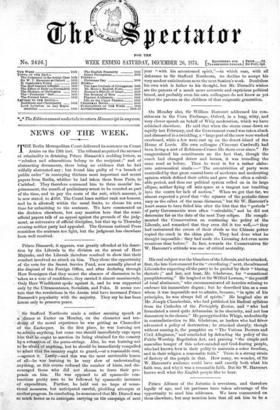On Monday also, Sir William Harcourt addressed his con- stituents
in the Corn Exchange, Oxford, in a long, witty, and very clever speech on behalf of Whig moderation; which we have criticised elsewhere. He said that when the storm-came down so rapidly last February, and the Government vessel was taken aback and dismasted in is twinkling, a " large part of the crew were washed overboard, while a few were cast up on the desert island of the House of Lords. His own colleague (Viscount Cardwell) had been living a sort of Robinson-Crusoe life there ever since." Ho congratulated his constituents on the fact that, though the coach had changed driver and horses, it was trundling the same road as- before. Then he went in for a rather elabo- rate astronomical simile :—" The eccentricities of party were controlled by that great central force of moderate and moderating opinion which defined their orbits and gave them often a calcul- able period, and thus our political system rolled on in its large ellipse, neither flying off into space at a tangent nor tumbling into the centre for lack of motion." When we got that far, we almost expected a proof that "the squares of the periodic times vary as the cubes of the mean distandes," but Sir W. Harcourt's heart seems to have failed him after the hint that the " periods " of party Governments were often " calculable," and he did not determine for us the date of the next Tory eclipse. He compli- mented the Conservatives on continuing the policy of the Liberals, and remarked that they even did it too well,—" they had caricatured the errors of their rivals as the Chinese potter copied the crack in the china plate. They had done what lie thought impossible : 'they had made the Licensing Act even more vexatious than before." In fact, towards the Conservatives Sir W. Harcourt's attitude was one of critical neutrality.


































